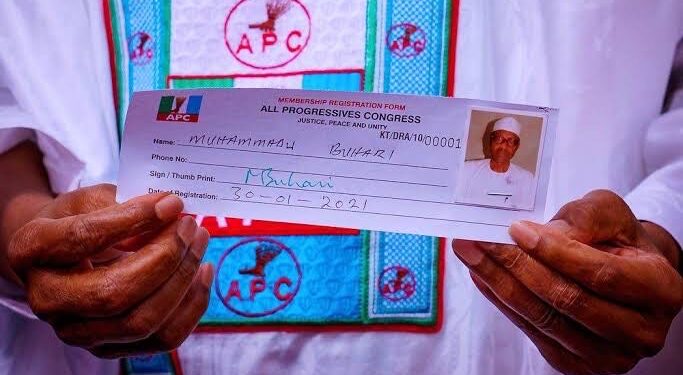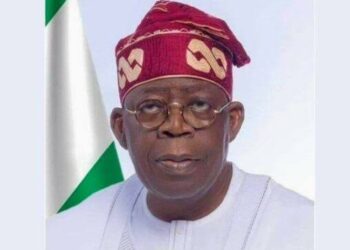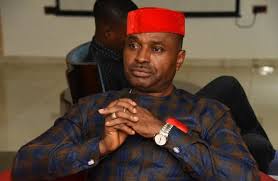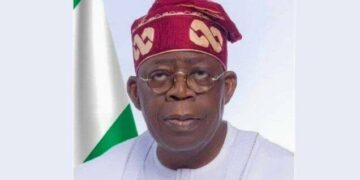The national leadership of the All Progressives Congress (APC) recently took a significant step in the realm of political party governance by officially initiating the membership e-registration exercise, marking a pivotal move towards digitalizing the party.
An early sign of the APC’s endeavor to establish a national membership database emerged in 2014 when the party discreetly launched a membership data center in Lagos ahead of the 2015 general elections, which garnered admiration from many Nigerians.
Diverging from the approach of the then-ruling Peoples Democratic Party (PDP), the APC asserted that the data center was intended to house internal party membership information and act as a vital tool for communicating with its members during the elections.
Nonetheless, the initiative was clouded in controversy, with the PDP alleging that the opposition party was planning to clone Permanent Voters Cards (PVCs) and employ technology to breach the Independent National Electoral Commission’s (INEC) database, thus undermining the integrity of the 2015 general elections.
During the politically charged episode, the Department of State Services (DSS) intervened by shutting down the data center based on a petition and credible information it received, citing “unwholesome activities” occurring within the premises.
The DSS, through its then spokesperson, Marilyn Ogar, stated that “the petition alleged that those involved in the activities were cloning INEC PVCs with the aim of hacking into INEC’s database, tampering with it, and substituting the information with their own.”
In a strong rebuttal, the former National Publicity Secretary of the PDP, Olisa Metuh, criticized the opposition party for deceptively using the guise of establishing a membership database to orchestrate election rigging during the 2015 general elections.
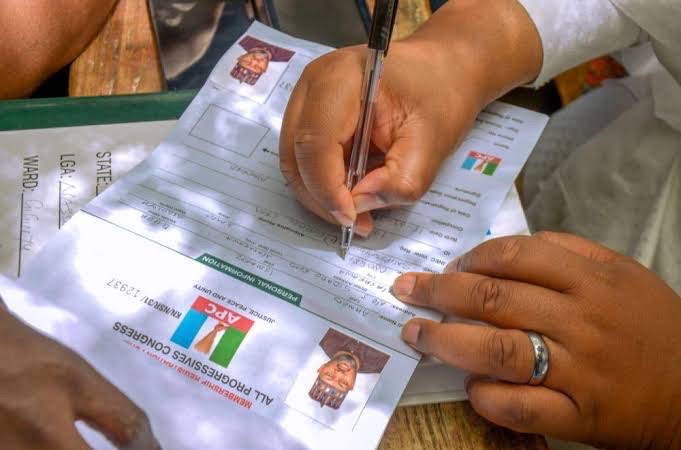
Metuh accused the APC of hypocritically accusing security agencies of colluding with INEC to rig elections when, in reality, the opposition party was employing these allegations as a smokescreen to construct the database and rig elections through INEC’s database manipulation.
According to Metuh, “The discovery at the APC office in Lagos validates our concerns and the apprehensions of many Nigerians regarding the APC’s criminal desperation, power hunger, intention to sow chaos and undermine our democracy.
“The APC has accused INEC and security agencies of conspiring to rig the 2015 elections in favor of the PDP. Little did Nigerians know that these were diversions intended to conceal their nefarious and unpatriotic schemes.
“We believe that in its relentless pursuit of power by any means, the APC has established cloning and hacking facilities in all 36 states of the federation to execute their deceitful plans to subvert the people’s will.
“Our citizens must, therefore, remain vigilant and resist any attempts by the APC to hijack their mandate. We also call on security agencies to thoroughly investigate this despicable cloning and ensure that those responsible face legal repercussions.”
However, regardless of one’s affiliation, the APC’s failure to launch and complete the project during the eight years under former President Buhari’s administration cast doubt on their previous assertions of innocence.
Notably, the APC-led government’s second attempt to establish a credible membership register took place in 2022 under Governor Mai Mala-Buni-led national leadership, which claimed to have conducted a similar exercise known as membership registration and revalidation nationwide.
Upon the conclusion of the exercise, the party announced a remarkable increase in its membership strength from 11 million to an astonishing 41 million members across the country.
Celebrating this achievement, Governor Buni declared, “The APC has successfully carried out a membership registration and revalidation exercise. We now boast over 41 million registered members across the country, each with detailed information.

“The APC remains Africa’s largest political party and Nigeria’s ruling party, with a membership that guarantees electoral victories,” Governor Buni proudly proclaimed.
However, this claim was refuted during the 2023 presidential election when the registered figure failed to translate into votes, with the ruling party garnering a mere nine million votes.
To rectify the situation and address the discrepancies, the current administration, led by Abdullahi Umar Ganduje, the National Chairman, took responsibility and pledged to conduct a more reliable, digitally-based membership registration exercise electronically, deviating from the flawed previous approach.
Acknowledging the party’s misleading membership register, National Secretary Senator Ajibola Basiru admitted that the APC had deceived Nigerians about the membership figure. He assured that the forthcoming electronic registration exercise would dispel doubts and provide clarity to concerned citizens.
During the project’s official launch, Basiru emphasized the significance of the initiative, stating, “In revealing this discrepancy, it is not to ridicule anyone but to acknowledge that mistakes were made. The party registers were misused for unknown purposes, leading to corruption. This prompted the National Working Committee (NWC) to prioritize a digitalized and biometric registration system linked to members’ National Identification Numbers.”
Regarding the registration process, Basiru highlighted, “I am pleased to announce that this endeavor includes a ‘Train the Trainers’ program to ensure effective implementation. Furthermore, knowledge is crucial for effective leadership.”
Chairman Ganduje expressed satisfaction with the initiation of the exercise, viewing it as a fulfillment of his commitment to the party members upon assuming office.
He stressed, “Upon my appointment as the National Chairman, I assured our party members that we would introduce new programs and policies to fortify our party and bolster our status as a grassroots progressive political party. One of these initiatives, among others, is the commencement of the e-registration of our members.
“Hence, we are gathered here to fulfill our promise and kickstart the digitalization of our party’s membership,” Ganduje declared during the launch.
Highlighting the importance of membership registration, the former Kano State governor articulated, “This process aims to provide a comprehensive overview of our party’s total membership, their distribution geographically, and demographic composition.
“This initiative will not only inform our planning, decision-making, and projection processes but also serve as a reference for party members aspiring to secure appointments or run for elections at any level.”
“The Application and Portal used by prospective trainees from the 36 States and FCT, Abuja, will soon be reactivated to enable both existing and new members to register online and join our party from anywhere globally. Each individual is required to submit their biometric data, which must align with the details captured in the National Identity Number (NIN), “Ganduje explained.
To encourage party members’ participation in the registration process, Ganduje announced stringent penalties for non-compliance, stating, “Those whose names are listed in the digital register will be recognized as true and loyal members of our esteemed party.”
In presenting an executive summary and elaborating on the exercise, the party’s technical partners described the Members Registration Portal as a comprehensive digital solution designed to streamline and enhance member registration, management, and engagement for organizations.
The platform aims to address the shortcomings of traditional paper-based or fragmented digital registration systems by offering a unified and user-friendly interface for both members and administrators.

Overall, electronic membership registration is a strategic investment for the party, enhancing efficiency, transparency, communication, and overall organizational effectiveness to ensure sustainable growth and success.
While some may argue that membership registration should not be a priority for a party grappling with multiple challenges, the exercise, in essence, is commendable. However, the party’s leadership must address inherent obstacles that plagued previous registration projects to ensure its success.
Reflecting on past experiences, the Governor Buni-led Caretaker Committee’s previous registration exercise faced hurdles such as protracted legal battles, financial constraints, and internal factional disputes, among other issues posed by party stakeholders.
The pertinent question now is the measures the party’s national leadership has taken to mitigate similar challenges, particularly in states where factionalism remains rampant, to facilitate a seamless registration process.
For instance, in Rivers State, where party unity is marred by factional conflicts and where certain factions are perceived as non-compliant, how will major stakeholders like former Minister of Transportation, Chibuike Rotimi Amaechi, and his political structure, who are seemingly part of the APC in body but not in spirit, be handled during the registration process?
Similar scenarios might unfold in state chapters like Enugu and Benue, where party stalwarts have been suspended or embroiled in power struggles, raising concerns about the credibility and acceptance of the project.
Moreover, the financial implications of executing a smooth registration exercise in states where the party lacks influence and members struggle to secure funding for critical projects must be considered.
Given the past misuse of a similar exercise for electoral manipulation, the credibility and legitimacy of the project are at stake. Therefore, it is imperative for the party’s leadership to ensure transparency and integrity throughout the registration process to regain the trust of its members and the public.


